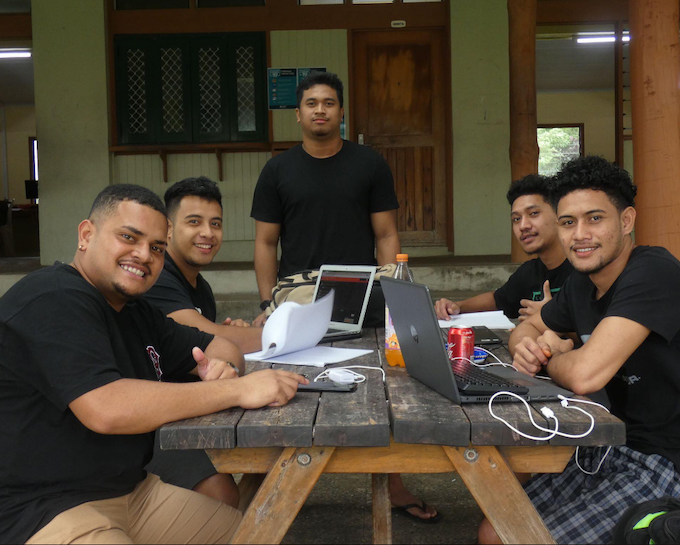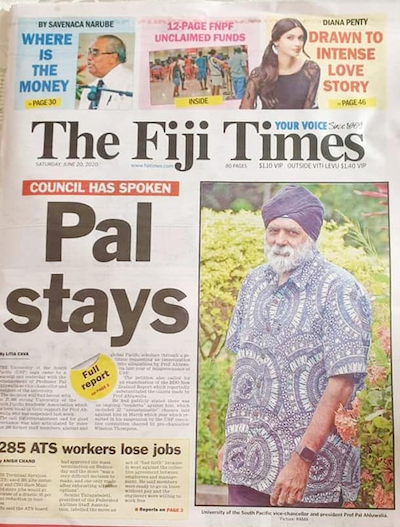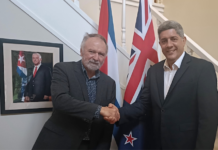
By Sri Krishnamurthi, contributing editor of Pacific Media Watch
Students sang with joy outside vice-chancellor Professor Pal Ahluwalia‘s home at the University of the South Pacific following his reinstatement by a special meeting of the USP Council yesterday.
The decision came after seven-hour meeting with the council voting 22-9 in favour of the reinstatement.
Concerned #StandWithPal staff and students maintained strong support and solidarity for good governance over the past two weeks and welcomed the council’s decision to reinstate Professor Ahluwalia.
READ MORE: Special reports on the USP leadership crisis
“The Council, having considered the decision by the Executive Committee to suspend the Vice-Chancellor & President, agrees that the process prescribed in An Ordinance to Govern the Discipline of the Vice-Chancellor be followed in investigating any allegations against the VC & President of USP,” a statement from the USP council secretariat said.
“I am exhilarated and absolutely delighted at the USP Special Council decision to reinstate VCP,” Professor Vijay Naidu told Pacific Media Watch.
“He should be able to provide the leadership without interference to take the university forward as an asset in higher education institution for the communities and governments of the region.
“VCP Professor Pal Ahluwalia’s honesty and integrity showed through the spurious and false allegations by obviously crooked people who had vested interest in the cover up,” he said.

Investigations continue
However, questions remain, and FijiVillage website reported that it had been informed that the allegations of material misconduct against Professor Ahluwalia would still be investigated.
However, he would remain in office during the investigation.
Also there are questions about the future of pro-chancellor Winston Thompson, a retired Fiji diplomat, who recused himself an hour before the meeting ended due to a conflict of interest as he was the chair of the USP executive committee that decided to suspend Ahluwalia pending independent investigations.
After he left the virtual meeting, the President of Nauru and the incoming chancellor of USP, Lionel Aingimea was left to chair the meeting, according to Vijay Narayan and Semi Turaga of the FijiVillage website.
A former long-time staff member at USP, Dr Wadan Narsey, told the ABC Pacific Beat programme the crisis represented a “collective failure by all of its stakeholders”.
Professor Ahluwalia’s supporters claim he was suspended because last year he had raised allegations of financial mismanagement that occurred under his predecessor, Professor Rajesh Chandra.
Although appointed in November 2018, Professor Ahluwalia formally took up his role in January 2019.
Concerned staff allegations
Within six weeks of taking office, concerned staff had gone to Professor Ahluwalia with allegations.
In April 2019, Professor Ahluwalia sent a paper entitled “Issues, Concerns and Breaches of Past Management and Financial Decisions” alleging wrongdoing by the former administration.
Economist Dr Narsey said the issues identified by Professor Ahluwalia should have been noticed long ago by the university’s financial management team, the governing council and student and staff associations.
“USP is not a private company, it’s actually a public company owned by all the taxpayers of the region and all the governments,” he told Pacific Beat.
“Clearly the university council has failed to pick up all these things … academics at the university have failed to raise these issues … students have become a lot less active in the last decade,” he said.
Dr Narsey said Australia and New Zealand also needed to shoulder some of the responsibility for not stepping in earlier.
Fiji’s Minister for Education, Heritage and Arts Rosy Akbar, a member of the USP Council, told FijiVillage that it was not Fiji’s decision to not make the BDO New Zealand Report public, and Fiji had supported the appointment of the three-member committee which was still looking into the findings of the report.











































